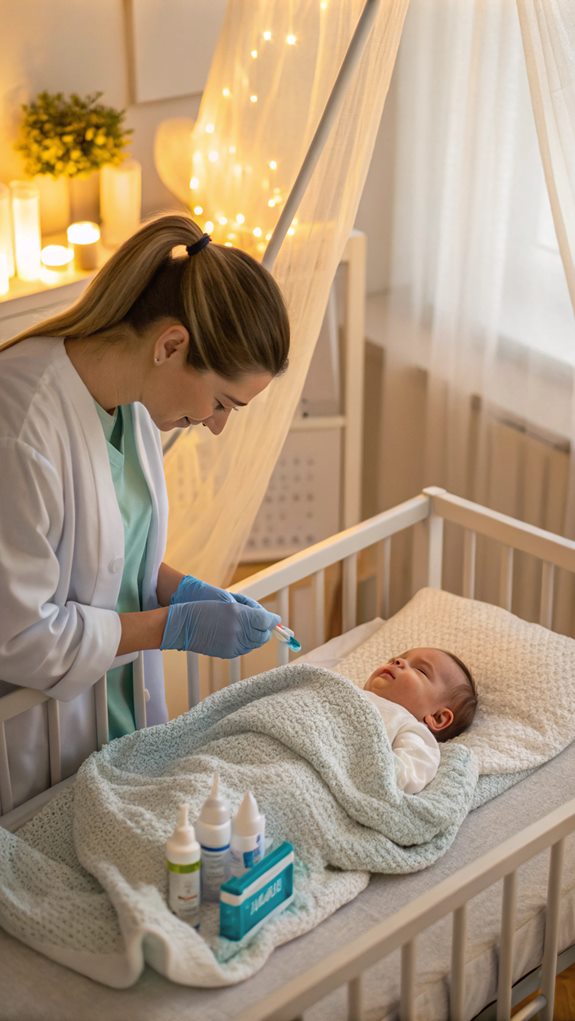Alright, new parent, here’s your quick guide to essential newborn care! First, keep that tiny human warm with skin-to-skin contact—your body’s like a cozy little heater. Next, get them breastfeeding ASAP; it’s like their first superfood! Don’t forget to clamp that umbilical cord later and let them soak up those iron-rich blood benefits. Also, give them a vitamin K shot to avoid any scary bleeding issues. And of course, check for signs of trouble—like jaundice or fever—because early action is vital! Keep those tips in mind, and there’s more to uncover about your baby’s needs!
Key Takeaways
- Ensure immediate skin-to-skin contact to regulate temperature and promote bonding between the caregiver and newborn.
- Initiate exclusive breastfeeding within the first hour to enhance nutrients and provide immune protection.
- Administer vitamin K within the first hour to prevent vitamin K deficiency bleeding (VKDB).
- Practice thorough thermal regulation by drying the newborn and monitoring their temperature closely.
- Properly identify newborns with ID bands and assess health within the first 24 hours of life.
Importance of Immediate Care

Immediate care for newborns is essential in the first moments after birth. You wouldn’t want that tiny bundle of joy getting cold or struggling to breathe, right? That’s where immediate care comes in. It’s all about drying, stimulating, and checking their breathing. This helps prevent neonatal hypothermia and keeps those little lungs working well.
Now, let’s talk about skin-to-skin contact. It’s like giving your baby a warm hug right from the start! This not only keeps them cozy but also encourages bonding and helps with thermal care. Plus, if you start exclusive breastfeeding within the first hour, you’re giving them a superhero enhancement of nutrients and immune protection.
Oh, and don’t forget delayed cord clamping! This isn’t just fancy talk; it means more blood from the placenta goes to your baby, filling them up with iron and reducing anemia risk.
Trust me, these immediate care practices can drop the neonatal mortality rate by a whopping 72%! That’s huge! So, when it comes to those first moments, you really can make a difference and help save little lives. Let’s get this right!
Skin-to-Skin Contact
Skin-to-skin contact (SSC) is an incredible practice that brings your newborn close to your chest right after birth.
It’s like a warm cuddle that helps both of you bond immediately. This cozy connection is more than just sweet snuggles. It’s essential for your baby’s health!
Here’s why you shouldn’t skip this magical moment:
- It helps regulate your newborn’s temperature, keeping them nice and toasty.
- SSC enhances your baby’s immune system by transferring protective bacteria from you.
- Spending at least 90 minutes in this hold can lead to calmer, healthier, and stronger babies.
When you hold your little one skin-to-skin, you’re not just practicing care; you’re laying the groundwork for successful breastfeeding, too.
Babies who get SSC often latch on better and feed more effectively, which is fantastic for both of you. Plus, it makes you feel like a superhero!
Early Breastfeeding Initiation

Initiating breastfeeding within the first hour after birth is essential for your newborn’s health. Think of it as a superhero move! Early breastfeeding initiation not only gives your baby the essential nutrients they need but also provides immune protection right from the get-go. This simple act can reduce neonatal mortality by a whopping 32%. That’s huge!
You’ll want to aim for exclusive breastfeeding for the first six months. This means your little one gets all their meals from you—no bottles, no formula. It helps protect against nasty illnesses like diarrhea and pneumonia, plus it speeds up recovery when your baby does get sick.
Now, here’s a little tidbit: only about 82.1% of obstetric care providers are on board with starting this process within the first hour. So, it’s clear we need to spread the word!
And let’s not forget about your health, too. Early breastfeeding can help space out births and lower your risk of breast and ovarian cancers.
Umbilical Cord Care
After your little one has had their first meal, it’s time to focus on umbilical cord care. This little stump may not seem like much, but keeping it clean and dry is super important to prevent infections. We all want to avoid those pesky neonatal issues, right?
Here are some essential tips for umbilical cord care:
- Let it breathe: Don’t cover the stump with alcohol or antiseptic; it needs air to heal properly.
- Keep an eye on it: Watch for any signs of infection, like redness or swelling. If you spot anything unusual, reach out to your health care provider.
- Patience is key: The stump usually falls off in 1 to 3 weeks, so hang tight!
You’re already doing great by having immediate skin-to-skin contact and breastfeeding within the first hour.
Every little step you take enhances the quality of maternal and infant care and helps reduce infant mortality.
Vitamin K Administration

One vital step in your newborn’s care is the administration of vitamin K, which plays an important role in preventing vitamin K deficiency bleeding (VKDB).
You see, VKDB can lead to serious problems, like bleeding in the brain — not something you want for your little one!
The World Health Organization recommends giving a single intramuscular dose of vitamin K (1 mg) to all newborns within the first hour after birth. This helps guarantee they’ve enough vitamin K, especially if they’re breastfed.
Why? Because breast milk is low in vitamin K, putting those tiny humans at risk for VKDB without that vital shot.
Now, here’s a fun fact: about 48.8% of obstetric care providers actually stick to giving the right dose of vitamin K. That’s a bit of a gap, right?
If you skip this step, you’re opening the door to increased morbidity and mortality due to bleeding complications.
Thermal Regulation Strategies
Following the administration of vitamin K, another important aspect of newborn care is thermal regulation. Keeping your little one warm is essential to prevent hypothermia, which, let’s face it, isn’t something you want to mess around with.
If you want to be a superstar in newborn care, here are some key strategies:
- Dry the baby thoroughly: Right after birth, make sure to dry off your newborn. This helps lock in warmth and avoid that “chilly baby” situation.
- Skin-to-skin contact: Jump into some cozy Kangaroo Mother Care! This creates a warm, snuggly environment and helps with breastfeeding too. It’s like a two-for-one deal!
- Temperature monitoring: Keep a close eye on their temperature. If it dips below 36.5°C (97.7°F), you’ll need to act fast.
Also, don’t forget about delayed cord clamping! Giving those extra minutes allows your baby to receive more blood from the placenta, which is great for their warmth and health.
Identification and Weighing
Proper identification and measuring of newborns are critical steps in ensuring their safety and health. You might think it’s a no-brainer, but only 5% of healthcare providers consistently put those cute little ID bands on infants. That’s a big gap!
And when it comes to assessing newborns, it’s just as important. Accurate assessment helps you keep tabs on their growth and health outcomes. Research shows that about 81.6% of folks get this right, but we can do better!
You should assess newborns within the first 24 hours. This isn’t just a random suggestion; it’s essential newborn care! It establishes baseline data that you can use to track their development.
If you’re a healthcare provider, remember that effective training and sticking to protocols can make a huge difference.
Recognizing Danger Signs
Recognizing danger signs in newborns is essential for ensuring their health and safety. As a care provider, you’ve got to keep your eyes peeled for anything unusual. After all, those tiny humans can’t tell you when something’s wrong!
Here are some key signs to watch for:
- Jaundice: If your little one starts to look like a tiny banana within the first 24 hours, get them checked out.
- Temperature instability: Is your newborn too hot or too cold? Hypothermia (below 36.5°C) or hyperthermia (above 37.5°C) can be serious.
- Signs of infection: A fever above 38°C, irritability, or difficulty waking up? That’s a definite reason to call in the health workers!
Also, keep an eye out for gastrointestinal problems, like excessive vomiting, diarrhea, or a bloated tummy. These could signal infections that need immediate action.
Share On X
Conclusion
So, there you have it! Those first few moments with your little one are super important. Did you know that babies who get skin-to-skin contact right after birth are 50% more likely to breastfeed? That’s a big deal! By sticking to these essential newborn cares, you’re giving your tiny human the best start possible. Plus, it’s a great excuse to snuggle a lot—who doesn’t love that? Now, go ahead and rock that parenting thing!
Join our list
Subscribe to our mailing list and get interesting stuff and updates to your email inbox.

